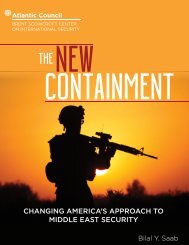POLITICS GOVERNANCE STATE-SOCIETY RELATIONS
Politics_Governance_and_State-Society_Relations_web_1121
Politics_Governance_and_State-Society_Relations_web_1121
You also want an ePaper? Increase the reach of your titles
YUMPU automatically turns print PDFs into web optimized ePapers that Google loves.
<strong>POLITICS</strong>, <strong>GOVERNANCE</strong>, AND <strong>STATE</strong>-<strong>SOCIETY</strong> <strong>RELATIONS</strong><br />
II. THE <strong>STATE</strong>S WE ARE IN: EXISTING MODELS<br />
FOR <strong>GOVERNANCE</strong> IN THE MIDDLE EAST<br />
Nearly five years after the Arab uprisings, and<br />
with the failure of all but one effort at governance<br />
transformation, we look across the Arab world and<br />
see several failed or failing states, new authoritarian<br />
models, and a number of recalcitrant autocracies<br />
holding on through a combination of heavy spending,<br />
increased coercion, and the soft bigotry of low<br />
expectations generated by fear both at home and<br />
abroad (“At least we’re/they’re not ISIS”). The “black<br />
holes” of Syria, Yemen, Libya,<br />
and increasingly Iraq threaten to<br />
engulf more of the region, and<br />
the consequences of these failed<br />
states for regional governance<br />
will be profound and long term.<br />
In the face of this challenge,<br />
what alternative models for<br />
governance are competing for<br />
dominance in the Middle East<br />
today?<br />
Fragile Democracy:<br />
Tunisia<br />
The “sole survivor” of the Arab<br />
Spring has now approved a<br />
democratic constitution and<br />
has held two sets of free and<br />
fair national elections. It has an<br />
elected president and a coalition<br />
government that includes the main Islamist and<br />
main secularist parties. Tunisia has thus marked<br />
tremendous achievements in consolidating<br />
its democratic transition, and it has overcome<br />
significant obstacles in doing so.<br />
A few factors unique to Tunisia’s pathway help<br />
explain its success. First, key political factions<br />
agreed on core principles relating to religion<br />
and state years before the revolution—setting<br />
a standard, even if not a binding precedent, to<br />
guide them when the regime of Zine El-Abidine<br />
Ben Ali fell. 19 Second, the Muslim Brotherhood–<br />
linked Ennahda sought to avoid sole responsibility<br />
for the political transition, and thus rejected the<br />
19 Alfred Stepan, “Tunisia’s Transition and the Twin Tolerations,”<br />
Journal of Democracy, Vol. 23, No. 2 (April 2012), 89-103.<br />
Tunisia’s civil society<br />
organizations<br />
played a crucial<br />
role in mediating<br />
political conflict:<br />
they insisted on<br />
open dialogue on<br />
constitutional issues<br />
that. . . gave society<br />
resilience in the face<br />
of divisions. . .<br />
winner-take-all approach to politics favored by<br />
other large parties in other post-revolutionary<br />
contexts. Instead, Ennahda restrained itself from<br />
seeking to dominate all political institutions despite<br />
its plurality support after the first elections, and<br />
shared coalition government with secular parties.<br />
Third, neither Islamist nor secular parties gave in<br />
to the more extreme voices within their respective<br />
factions, and pushed back against polarization even<br />
in the face of violent attacks by<br />
Salafi groups against tourist sites<br />
and two political assassinations.<br />
Fourth, Tunisia’s transition plan<br />
prioritized constitution writing<br />
over political competition,<br />
forcing parties to agree on rules<br />
for the political game while they<br />
were still unsure of their own<br />
political strength and still faced<br />
the heightened expectations and<br />
scrutiny of a highly mobilized<br />
public. Fifth, Tunisia’s civil<br />
society organizations played a<br />
crucial role in mediating political<br />
conflict: they insisted on open<br />
dialogue on constitutional issues<br />
that, in the end, gave society<br />
resilience in the face of divisions,<br />
and they pressured politicians<br />
past disagreement to a successful conclusion of the<br />
constitution-drafting process. Fortunately, Tunisia’s<br />
second set of elections, often a danger point for<br />
new democracies, also generated results that did<br />
not allow for exclusionary governance, and thus<br />
produced another coalition that included both<br />
Islamist and secular parties.<br />
Tunisia also managed to escape, to a certain<br />
degree, some of the influences that hampered<br />
other attempted transitions after the Arab Spring:<br />
it experienced relative neglect from regional actors,<br />
who were working to advance their preferred<br />
political outcomes in other places (namely, Libya,<br />
Egypt, and Syria) but who played wait-and-see with<br />
Tunisia’s coalition government. This gave Tunisians<br />
the space they needed to make their own bargains.<br />
Tunisian political leaders also sought to insulate<br />
ATLANTIC COUNCIL<br />
21



